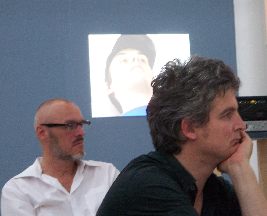Sunday, July 30, 2006
Alberto Giacometti
Zurich Beach
Saturday, July 29, 2006
The Wisdom Fallacy: Why Management Is Really Like Math
>>People separate knowledge into two major categories. The first consists of areas where some people know more than others (math, physics, computer programming, history, linguistics, etc.) and the second consists of areas where they don't (religion, politics, raising a family, etc.). The second area has always baffled me. Why will people willingly say they know nothing about math, but will rarely admit the same thing about politics or religion? Why will people accept advice on a subject, from someone that has studied it in depth, if that subject is programming, but not if it has to do with raising their children? Why, in some areas of knowledge, do we equate studying with mastery, and in other areas we don't? I'll call this the "wisdom fallacy" - that people believe wisdom has no correlation with knowledge for some subjects, when really it does.<<
Tuesday, July 25, 2006
The Expert Mind
The article is long and a bit boring, but here are some gems:
>>The one thing that all expertise theorists agree on is that it takes enormous effort to build these structures in the mind. Simon coined a psychological law of his own, the 10-year rule, which states that it takes approximately a decade of heavy labor to master any field. Even child prodigies, such as Gauss in mathematics, Mozart in music and Bobby Fischer in chess, must have made an equivalent effort, perhaps by starting earlier and working harder than others.
According to this view, the proliferation of chess prodigies in recent years merely reflects the advent of computer-based training methods that let children study far more master games and to play far more frequently against master-strength programs than their forerunners could typically manage. Fischer made a sensation when he achieved the grandmaster title at age 15, in 1958; today's record-holder, Sergey Karjakin of Ukraine, earned it at 12 years, seven months.
Ericsson argues that what matters is not experience per se but "effortful study," which entails continually tackling challenges that lie just beyond one's competence. That is why it is possible for enthusiasts to spend tens of thousands of hours playing chess or golf or a musical instrument without ever advancing beyond the amateur level and why a properly trained student can overtake them in a relatively short time. It is interesting to note that time spent playing chess, even in tournaments, appears to contribute less than such study to a player's progress; the main training value of such games is to point up weaknesses for future study.
...
Thus, motivation appears to be a more important factor than innate ability in the development of expertise.
...
Furthermore, success builds on success, because each accomplishment can strengthen a child's motivation. A 1999 study of professional soccer players from several countries showed that they were much more likely than the general population to have been born at a time of year that would have dictated their enrollment in youth soccer leagues at ages older than the average. In their early years, these children would have enjoyed a substantial advantage in size and strength when playing soccer with their teammates. Because the larger, more agile children would get more opportunities to handle the ball, they would score more often, and their success at the game would motivate them to become even better.<<
Saturday, July 22, 2006
Luca Frei

Last Saturday I got into an interesting conversation with artist Luca Frei after I bought a new microphone for my mp3 player. He asked, if i would record the sound of the city, which was not my intention. But I had heard before that there are people bringing back home "sound prints" from their vacation spots.
Same day he gave a speach at the Shedhalle about Power and Culture.


Here is a snippet of his presentation.

Among others I like his work What is our goal?, especially the word "our". It reminds me of Brahms's Requiem with the line Was ist dein Ziel?.

Moreover I like images with people next to a painting like here and here.
Sunday, July 16, 2006
Stumbling on Happiness
Did not read it myself, but found these amazon comments interesting...
A pretty happy read- but not as happy as you think it is going to be, May 6, 2006
| Reviewer: | Shalom Freedman "Shalom Freedman" (Jerusalem,Israel) - See all my reviews |
1) We often exaggerate in imagining the long- term emotional effects certain events will have on us.
2) Most of us tend to have a basic level of happiness which we revert to eventually.
3) People generally err in imagining what will make them happy.
4) People tend to find ways of rationalizing unhappy outcomes so as to make them more acceptable to themselves.
5) People tend to repeat the same errors in imagining what will make them happy.
6) Events and outcomes which we dread may when they come about turn into new opportunities for happiness.
7) Many of the most productive and creative people are those who are continually unhappy with the world- and thus strive to change it.
8) Happiness is rarely as good as we imagine it to be, and rarely lasts as long as we think it will. The same mistaken expectations apply to unhappiness.
Gilbert makes these points and others with much anecdotal evidence and humor.
A pretty happy read, but not as happy as you think it is going to be.
Interesting with flaws, June 16, 2006
| Reviewer: | Stan Vernooy (Henderson, NV) - See all my reviews |
To use an example: a couple of other reviewers have already mentioned Gilbert's story of a victory in an important college football game. Students predict in advance that they will be ecstatic if their team wins, and a different study suggests that a few months after the fact they will contend that they WERE ecstatic. However, close monitoring of their feelings at the actual time of the victory, or shortly thereafter, suggests that they weren't as happy as they expected to be, or as they later recalled being. On a less trivial topic, he makes the same claim regarding the experience of having and raising children: It isn't as much fun as the parents expect it to be. And while the child-rearing was going on, it wasn't as happy an experience as they later remembered it to be. But Gilbert is ignoring a vital point here: The anticipation of happiness, and the recollection of happiness, ARE happiness! Gilbert writes the entire book with the unexamined assumption that happy anticipations and happy memories can be discarded as mere illusions - the fabrications of irrational minds. I think he's wrong.
...
Wednesday, July 12, 2006
Frame of Mind
 Saw this in Zurich today (2006-07-11). NZZ writes "Zidane's ugly farewell in world cup final" while the Tages Anzeiger writes: "Zidane celebrated as hero"
Saw this in Zurich today (2006-07-11). NZZ writes "Zidane's ugly farewell in world cup final" while the Tages Anzeiger writes: "Zidane celebrated as hero"I always liked the Tagi better.
And here for the kids (the usual stuff that floats around in the office, but can't see this enough):

And finally, you gotta love him, check out this google video.
Saturday, July 08, 2006
Sunday, July 02, 2006
Howdy Stranger!
>>To Rashid's surprise, he found participants who bowled with strangers were happier than students who hand-picked buddies to accompany them (and, as expected, people who bowled by themselves). For those who made new friends, the experience was similar to a successful date. Says Rashid, "They were euphoric." Although college students tend to be an outgoing bunch, Rashid says one's level of extroversion didn't predict who would see the greatest uptick in mood.<<
Maradona - life is life
Suicide blights China's women
http://news.bbc.co.uk/2/hi/asia-pacific/2526079.stm
>> But the most significant finding was that, unlike almost everywhere else in the world, more women than men commit suicide.
...
"It appears that many of them are impulsive events following an acute fight or an argument with the husband or a parent or a mother in law," he told the World Today programme.
But the biggest single reason why so many suicide attempts in China are successful is their method.
Nearly two-thirds of them are by consuming pesticides and powerful rat poisons which are extremely easy to buy in China.
...
In China, there is also a lack of social and religious taboos against taking one's own life.
"In some particular villages it almost becomes normalised. If a young woman is having trouble, this is one way she'll express her displeasure," Dr Phillips said.<<

